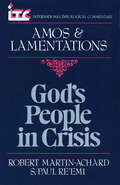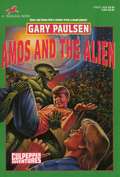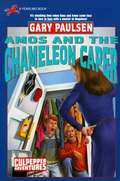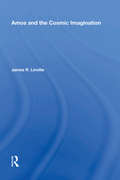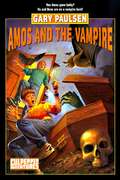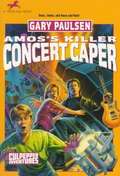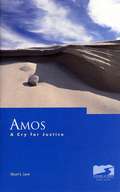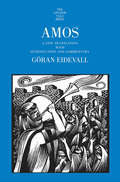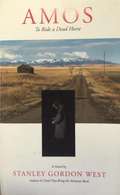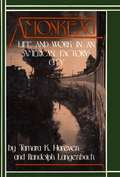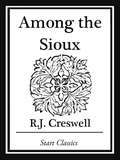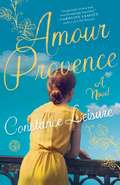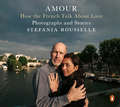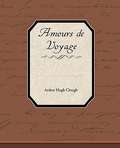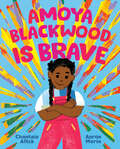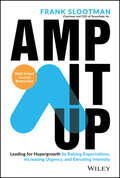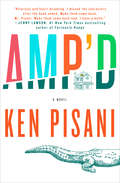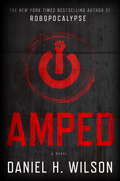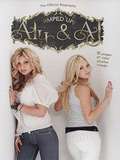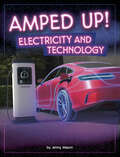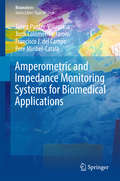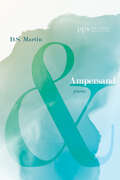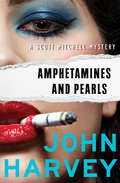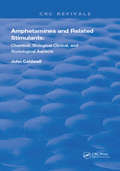- Table View
- List View
Amos and Lamentations: God's People in Crisis (International Theological Commentary (ITC))
by S P Re'emi Robert Martin-Achard"Here in a straightforward and readable way S. Paul Re'emi takes us into the experience of exile in Lamentations, while Robert Martin-Achard takes us behind that moment into Amos's confrontations with Israel which preceded her exile. The commentaries enable the reader to appreciate much of the prayer and the challenge that these two books expressed, and encourage us to see them as not merely ancient texts but theological resources for the modern world." — John Goldingay St. John's College, Nottingham
Amos and the Alien (Culpepper Adventures)
by Gary PaulsenIn helping an extraterrestrial get back to his planet, Amos hides him under his bed while he and Dunc think of what to do, until Amos starts displaying new powers on the football field, and Dunc thinks the mysterious alien is behind it.
Amos and the Chameleon Caper (Culpepper Adventures)
by Gary PaulsenPaulsen's funny sleuths meet up with a master of disguises! Culpepper Adventures #27.
Amos and the Cosmic Imagination (Society For Old Testament Study Ser.)
by James R. LinvilleSaid to contain the words of the earliest of the biblical prophets (8th century BCE), the book of Amos is reinterpreted by the author in light of new and sometimes controversial historical approaches to the Bible. Amos is read as the literary product of the Persian-era community in Judah. Its representations of divine-human communication are investigated in the context of the ancient writers' own role as transmitters and shapers of religious traditions. Amos's extraordinary poetry expresses mythical conceptions of divine manifestation and a process of destruction and recreation of the cosmos which reveals that behind the appearances of the natural world is a heavenly, cosmic temple.
Amos and the Vampire (Culpepper Adventures)
by Gary PaulsenAmos's big sister Amy is always dating rejects. But this time, her boyfriend was rejected by the grave! He's got pale skin, dark hair, mesmerizing eyes, an annoying tendency to disappear, and he wants to have the Culpeppers over for a late night Halloween snack.... Can Amos and his best friend, Dunc, stop the vampire before he starts to bite? Or will Amy and her man do a little necking she will never forget? Join Gary Paulsen's cool sleuths in their creepiest caper yet!
Amos's Killer Concert Caper
by Gary PaulsenAmos is desperate. He's desperate for two tickets to the romantic event of his young life...the Road Kill concert! He'll do anything to get them because he heard from a friend of a friend of a friend of Melissa Hansen that: she's way into Road Kill.
Amos: A Cry for Justice (Streams of Mercy #4)
by Stuart L. LoveEight centuries before Jesus Christ walked this earth, a prophet named Amos denounced the society he saw around him. What he condemned in and around ancient Israel - the wealthy oppressing the poor, idolatry corrupting worship, and a host of other vices - parallels to a remarkable degree our own society's conditions. In this short, well-written study, Stuart Love takes the reader through a directed reading of the entire book of Amos, offering the seeker opportunities to reflect on both the ancient text and its applications for the 21st-century world.
Amos: A New Translation with Introduction and Commentary
by Göran EidevallA new translation and commentary on the book of Amos, forgoing speculation about his life to provide an innovative analysis of the book itself As part of the Hebrew Bible, the Book of Amos has been studied for more than two thousand years. This much-needed new edition includes an updated English translation of the Hebrew text and an insightful commentary. While previous scholarship speculated on reconstructions of the life of Amos, Eidevall analyzes this prophetic book as a literary composition, rejecting the conventional view of the book of Amos’s origin and providing a new rationalization for the form and meaning of the text.
Amos: To Ride A Dead Horse
by Stanley G. WestSet in the early '60s in a sudden turn of events, Amos survives a tragic accident that kills his wife and leaves him with a shattered hip, without family, and penniless, he is taken to the county poor farm, Sunset Home. Having nothing to live for, Amos believes his life is over and he resolves to let go and die as quickly as possible, isolating himself from the other residents of the poor farm. Under head nurse Daisy Daws's iron rule, Amos witnesses the unthinkable horror by chance in the middle of the night. This reawakens his deeply felt sense of justice and he resolves to live on. He can't let her get away with it.
Amoskeag: Life and Work in an American Factory-City
by Tamara K. Hareven Randolph LangenbachFirst published in 1978, this classic book, through vivid oral histories and historic photographs, documents the social and cultural impact of the industry during America's rise as a manufacturing power. For nearly a century, the Amoskeag Manufacturing Company was chief architect of the social, ethnic, and economic existence of Manchester, New Hampshire. In the early 1900s, it was the largest textile mill in the world, employing 17,000; its red brick facade stretched for nearly a mile along the Merrimack River and its payroll drew immigrants by the thousands. In their own words, laborers, foremen, managers, and town residents paint a detailed portrait of the mill's nearly feudal dominance of every aspect of their lives and offer their response to this existence, with fierce pride and an unshakable sense of community. When competition, labor unrest, and obsolescence caught up with the mill in 1936, a weaver recalls, "the mills went out and the world stopped for everybody. "
Amoung the Sioux
by R. J. CreswellThe sketches which make up this little volume are of absorbing interest, and are prepared by one who is abundantly qualified to do so. Mr. Creswell has had large personal acquaintance with many of those of whom he writes and has for years been a diligent student of missionary effort among the Sioux. His frequent contributions to the periodicals on this subject have received marked attention.
Amour Provence: A Novel
by Constance LeisureA lush, evocative, debut novel set in Provence about the people who grow up and live and remain in two tiny neighboring villages--from the Nazi occupation to the present day--in particular, one man and one woman who have yet to find love.In the south of France farm life unfolds with the rhythm of the seasons. But the lives of these villagers in Amour Provence reflect the reality that the midi is a place of extremes, the summers of unbearable heat and the winters that are often rude and harsh. Like the climate, the characters find themselves swept away by storms of unannounced and devastating intensity. A vintner's adolescent son has a passionate romance with his schoolmate's mother and they suffer different and enduring consequences. A young Arab woman forced into an arranged marriage, learns that life in the land of Liberté and Egalité can be just as confining as in her own country. A French woman who has lived abroad for many years returns home and discovers that certain members of her family are not pleased to have her back. An unexpected encounter with his past brings new sparks of life to a man who believed he had lost everything, including the only woman he ever loved. In these two small adjacent villages in the South of France, characters lead lives that overlap and intertwine. Many are close neighbors who have known each other from childhood, linked by ancestors who clung for centuries to their patrimony, the land, which had always been poor, but is now a source of wealth drawn from wine, olives, and tourists. They know a great deal about each other's hidden passions and weaknesses. Age-old resentments and closely guarded secrets retain their hold but are never to be discussed. Amour Provence is a portrait of lives deeply lived, shadowed by the past, against the backdrop of a region and a nation gripped by change.
Amour: How the French Talk About Love--Photographs and Stories
by Stefania RousselleFrom award-winning journalist and filmmaker Stefania Rousselle, a stunning collection of photographs and essays that seek to understand the universality of love Journalist and filmmaker Stefania Rousselle found herself overwhelmed and dejected with the horrors of the news after covering terrorist attacks, human trafficking, and the rise of extremism. To renew her faith in humanity, she took off on a solo road trip across France, determined to see if love still exists. Traveling from village to village, farming towns to industrial cities, heart to heart, Rousselle sought out ordinary women and men, all to ask them one question, What is love?Collecting more than 90 personal testimonies, each one moving and beautiful in its own way, alongside over 100 intimate photographs, Rousselle reveals the many facets of love, and discovers that love can still be found even in the darkest of places. From a baker in Normandy to a shepherd in the Pyrenees, from a tree trimmer in Martinique to a mail woman in the Alps, Amour is a visual testament to love in all its many forms.
Amours De Voyage
by Arthur Hugh CloughOver the great windy waters, and over the clear-crested summits, Unto the sun and the sky, and unto the perfecter earth, Come, let us go,--to a land wherein gods of the old time wandered, Where every breath even now changes to ether divine. <P> <P> Come, let us go; though withal a voice whisper, 'The world that we live in, Whithersoever we turn, still is the same narrow crib; 'Tis but to prove limitation, and measure a cord, that we travel; Let who would 'scape and be free go to his chamber and think; 'Tis but to change idle fancies for memories wilfully falser; 'Tis but to go and have been.'--Come, little bark! let us go.
Amoya Blackwood Is Brave
by Chantaie AllickWhen a girl's confidence is shaken and she begins to shrink, her grandmother is there to remind her of who she is in this empowering picture book about self-esteem.Amoya Blackwood is loud, bold and carefree. She always has the answer in class. And she knows just what to say to make her friends laugh.Amoya Blackwood shows up with a smile on her face. She enters a room and takes up space.But one day Amoya Blackwood starts noticing that the adults around her want to be less loud, less bold, less carefree. They want her to take up less space, and so she does. She gets smaller and smaller and smaller.She gets so small she hardly recognizes herself.But then, a conversation with her Gran reminds Amoya of who she is. And a surprising thing happens . . .
Amp It Up: Leading for Hypergrowth by Raising Expectations, Increasing Urgency, and Elevating Intensity
by Frank SlootmanWall Street Journal, USA Today, and Publishers Weekly BestsellerThe secret to leading growth is your mindset Snowflake CEO Frank Slootman is one of the tech world's most accomplished executives in enterprise growth, having led Snowflake to the largest software IPO ever after leading ServiceNow and Data Domain to exponential growth and the public market before that. In Amp It Up: Leading for Hypergrowth by Raising Expectations, Increasing Urgency, and Elevating Intensity, he shares his leadership approach for the first time. Amp It Up delivers an authoritative look at what it takes to transform an organization for maximum growth and scale. Slootman shows that most leaders have significant room to improve their organization's performance without making expensive changes to their talent, structure, or fundamental business model—and they don’t need to bring in an army of consultants to do it. What they do need is to align people around what matters and execute with urgency and intensity every day. Leading for unprecedented growth means declaring war on mediocrity, breaking the status quo, and making conflicted choices daily, all with a relentless focus on the mission. Amp It Up provides the first principles to guide that change, and the tactical advice for organizing a company around them. Perfect for executives, entrepreneurs, founders, managers, and leaders of all kinds, Amp It Up is a must-read resource for anyone who seeks to unleash the growth potential of a company and scale it to heights they never thought possible.
Amp Up Your Sales: Powerful Strategies That Move Customers to Make Fast, Favorable Decisions
by S. Anthony Iannarino Andy PaulSalespeople today face a fast-paced and increasingly crowded marketplace where meaningful product differentiation has all but disappeared. To compete successfully, sellers must set themselves apart in the eyes of buyers. Amp Up Your Sales shows anyone how to become the trusted sales professional who consistently wins new business. Customers are overloaded with information, overwhelmed by options, and short on time--so the salesperson who is always responsive and completely focused on value, is the one who will stand out from the crowd and get the sale. Combining leading-edge research with field experience, the book shows readers how to: Maximize the value of their selling * Accelerate responsiveness to build trust and credibility * Earn valuable selling time with customers * Shape the buyer's vision * Integrate persuasive stories into their sales process * Build lasting relationships through follow-up and customer service Insightful and practical, the book arms salespeople with a powerful set of strategies they can use to spur buyers to say yes!
Amp'd: A Novel
by Ken Pisani"Complete with painfully wry observations and delightfully caustic wit, this novel is a gritty exploration of what it's like to feel incomplete in the world. All five fingers up for this bitterly satisfying tale." --Kirkus Reviews(starred)Aaron is not a man on a hero's journey. In the question of fight or flight, he'll choose flight every time. So when a car accident leaves him suddenly asymmetrical, his left arm amputated, looking on the bright side just isn't something he's equipped to do. Forced to return to his boyhood home to recuperate, Aaron is confronted with an aging father (a former Olympic biathlete turned hoarder), a mother whose chosen to live in a yurt with a fireman twelve years her junior, and a well-meaning sister whose insufferable husband proves love isn't just blind, but also painfully stupid.As Aaron tries to make the world around him disappear in a haze of Vicodin and medical marijuana, the only true joy in his life comes from daily ninety-second radio spots of fun science facts: the speed of falling raindrops, batteries made out of starfish, and sexual responses triggered by ringtones - all told in the lush, disembodied voice of commentator Sunny Lee, with whom he falls helplessly, ridiculously, in love. Aaron's obsession with Sunny only hastens his downward spiral, like pouring accelerant on a fire. Pressured to do something - anything - to move his life forward, he takes the only job he can get. As a "fish counter" at the nearby dam, he concludes that an act of violent sacrifice to liberate the river might be his best, final option.
Amped (Vintage Contemporaries)
by Daniel H. WilsonTechnology makes them superhuman. But mere mortals want them kept in their place. The New York Times bestselling author of Robopocalypse creates a stunning, near-future world where technology and humanity clash in surprising ways. The result? The perfect summer blockbuster. As he did in Robopocalypse, Daniel Wilson masterfully envisions a frightening near-future world. In Amped, people are implanted with a device that makes them capable of superhuman feats. The powerful technology has profound consequences for society, and soon a set of laws is passed that restricts the abilities--and rights--of "amplified" humans. On the day that the Supreme Court passes the first of these laws, twenty-nine-year-old Owen Gray joins the ranks of a new persecuted underclass known as "amps." Owen is forced to go on the run, desperate to reach an outpost in Oklahoma where, it is rumored, a group of the most enhanced amps may be about to change the world--or destroy it.Once again, Daniel H. Wilson's background as a scientist serves him well in this technologically savvy thriller that delivers first-rate entertainment, as Wilson takes the "what if" question in entirely unexpected directions. Fans of Robopocalypse are sure to be delighted, and legions of new fans will want to get "amped" this summer.
Amped Up
by Grace NorwichGo behind the scenes with these pop princesses!What do you get when you mix Miley Cyrus, Hilary Duff, and Mary- Kate & Ashley? Aly & AJ-the mega-talented acting and singing sister act! Now find out what makes these sisters so special and what their super-sweet lives are like behind the scenes. Whether they are making music, filming movies, or just hanging around, these girls always have something amazing going on, and we've got the inside scoop with 16 pages of exclusive photos and interviews with Aly & AJ!
Amped Up!
by Jenny MasonElectricity powers today’s most innovative technologies—from artificial intelligence to self-driving cars. In this nonfiction book for young learners, take an electrifying journey into our high-tech world powered by electricity. Explore how electric vehicles have revolutionized transportation. Check out the future of AI-driven smart devices. Discover how cutting-edge space rovers rely on electric power to explore planets beyond our own. Packed with engaging facts, hands-on activities, and dynamic photos, this book offers an in-depth look at the incredible electric-powered technology shaping our world today—and tomorrow.
Amperometric and Impedance Monitoring Systems for Biomedical Applications (Bioanalysis #4)
by Jordi Colomer-Farrarons Jaime Punter-Villagrasa Francisco J. del Campo Pere Miribel-CatalàThe book presents the conception and realization of a pervasive electronic architecture for electrochemical applications, focusing on electronic instrumentation design and device development, particularly in electrochemical Point-of-Care and Lab-on-a-Chip devices, covering examples based on amperometric (DC) and impedance detection (AC) techniques. The presented electronics combine tailored front-end instrumentation and back-end data post-processing, enabling applications in different areas, and across a variety of techniques, analytes, transducers and environments. It addresses how the electronics are designed and implemented with special interest in the flow process: starting from electronic circuits and electrochemical biosensor design to a final validation and implementation for specific applications. Similarly, other important aspects are discussed throughout the book, such as electrochemical techniques, different analytes, targets, electronics reliability and robustness. The book also describes the use of the presented electronics in different electrochemical applications through some examples: instantaneous and non-destructive cellular monitoring and portable glucose monitoring device. Moreover, the book aims to introduce a comprehensive approach to electronic circuits, techniques and electrochemical sensors in POC devices to a general audience of students in biomedical and electronics engineering, scientists, and engineers.
Ampersand: Poems (Poiema Poetry Series #29)
by D. S. MartinD.S. Martin's new poetry collection Ampersand brings together portraits & observations where the poet reflects upon artists, saints, reformers, poets, his own elderly parents, & various biblical characters--including twelve poems written for each of the twelve disciples. Ampersand--as the title suggests--brings together many disparate things, giving room for diverse reflections on human experience & the world in which we live.
Amphetamines and Pearls (The Scott Mitchell Mysteries #1)
by John HarveyA private investigator stumbles upon the body of a female singer in this mystery from an author praised by Elmore Leonard for his &“clean and simple&” prose. When Scott Mitchell loved Candi Carter, her name was just plain Ann. Back then she was a hippie, playing tambourine in some no-name band. Now she&’s the most famous singer in Britain, and she has plans to conquer America next—but first she needs her old friend&’s help. And when the famed songbird asks Mitchell to come down to her house in Nottingham, he can&’t refuse, even though the sound of her voice makes him feel like his heart is breaking all over again. He pulls himself out of an alcoholic haze, takes the train from London, and stumbles right into a murder scene. Mitchell finds Carter dead in her living room, a trickle of blood coming from her mouth and a bullet in her chest. Her body is still warm. But before he can get out of there, he&’s blackjacked, and when he comes to, he&’s picked up by a pair of cops who beat him senseless and drag him to the nearest cell. Mitchell is having a hell of a day—and things will only get worse from here. First published in 1976, this is the debut novel of John Harvey, who would go on to create the legendary hardboiled Charlie Resnick Mysteries. Harvey&’s first crack at transplanting the kind of tough-talking American PI of Raymond Chandler and John D. MacDonald to the United Kingdom works beautifully. Scott Mitchell isn&’t just the toughest detective in Britain—he&’s also the best. Amphetamines and Pearls is the 1st book in the Scott Mitchell Mysteries, but you may enjoy reading the series in any order.
Amphetamines and Related Stimulants: Chemical, Biological, Clinical, and Sociological Aspects (Routledge Revivals)
by John CaldwellFirst published in 1980: The current texts represent the state-of-the-art on the use and abuse of amphetamines and related stimulants, from chemical, pharmacological, clinical, and social aspects.
